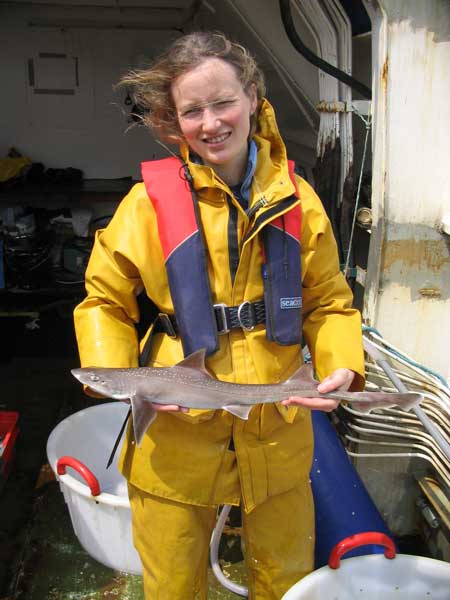I Want Your Job: Marine biologist
Dr Viki Wearmouth, 31, is a post-doctoral researcher working with the Marine Biological Association in Plymouth

Your support helps us to tell the story
From reproductive rights to climate change to Big Tech, The Independent is on the ground when the story is developing. Whether it's investigating the financials of Elon Musk's pro-Trump PAC or producing our latest documentary, 'The A Word', which shines a light on the American women fighting for reproductive rights, we know how important it is to parse out the facts from the messaging.
At such a critical moment in US history, we need reporters on the ground. Your donation allows us to keep sending journalists to speak to both sides of the story.
The Independent is trusted by Americans across the entire political spectrum. And unlike many other quality news outlets, we choose not to lock Americans out of our reporting and analysis with paywalls. We believe quality journalism should be available to everyone, paid for by those who can afford it.
Your support makes all the difference.What do you actually do?
I tag and track animals at sea, mainly sharks and rays, in order to understand their behaviour and look at their movement patterns. This research can then be used to assess the effects of fisheries exploitation on marine populations as well as the effects of future climate change. Sharks and rays are especially susceptible to over-exploitation.
Describe your typical day
If I'm in the office, it's a 9am-to-5.30pm sort of day, but if I'm off to sea then I have to be in the office by 7.30am. First, I get the measuring and tagging equipment ready as well as my wet gear, and then we're taken to the Marine Biological Association (MBA) research vessel, which leaves Plymouth dock at 8am.
It takes an hour to get to the fishing site, and the boat crew do a 40-minute trawl, putting a big net into the sea and pulling it along the sea bed. Then they pull the net on deck and our work begins. We sort out the different species and measure them. We put the sharks and rays aside in seawater tanks on the boat and tag them using an electronic data logger. Then we release the fish back into the sea. By this time, the crew has put the net down for the second time and we start again. After two or three tows we're generally back at the office by 2pm. I catch up with admin, and, if I can, start analysing the tracks of the fish we've tagged. I leave at 5.30pm, and the last thing I do is check that the fish in the labs are OK for the night.
Do you like your job?
I love it. When the nets come on to the boats, it's really exciting. For me, it's like Christmas, there are all these presents and you don't know what's inside them and what new species you might find. I've always liked the sea, ever since family holidays in Cornwall. I did a biology degree at Bristol University and the marine aspect interested me. I went on to do an MSc in marine and fisheries science at the University of Aberdeen. I wrote my PhD on sexual segregation in the small-spotted catshark. The best part of the job is the fieldwork. I love going out and catching new things and talking to local fishermen. The MBA is a small institution, but everyone is friendly. I like having students on board the vessel as it's nice to pass on what I know to them.
What's the hardest part?
There's quite a bit of public speaking. I attend conferences and have to address audiences of hundreds of people, and that can be daunting.
What skills do you need?
It's very practical work, and you have to think on your feet and to make decisions. You do report back, but you also need to work on your own, and there's no one to hold your hand. Being a researcher is a competitive route. You're generally on a three-year contact, so every few years you have to justify your existence and to get more funding. That means that you need to keep producing.
What would be your advice to people who want this career?
Volunteer. When I was at university, I volunteered to work at a turtle research centre in Greece, so approach an establishment like the MBA and get experience. Find out if it's something you want to do. It's a long process and you really have to know what the job is about.
What's your salary?
Post-docs start on £25,000. Researchers often become university lecturers, but right now I'm enjoying the research.
To find out more, visit www.mba.ac.uk
Join our commenting forum
Join thought-provoking conversations, follow other Independent readers and see their replies
Comments